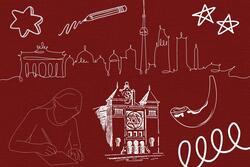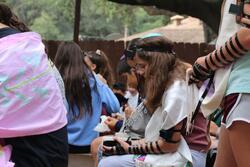Learning from My Synagogue's Feminist Advocate
Dr. Rayla Temin is a pillar in my Jewish community. From coordinating my parents’ aufruf and my baby naming, to serving as gabbai rishon at me and my brothers’ b’nai mitzvah celebrations, her relationship with my family and my synagogue has shaped my Jewish upbringing. Despite her significant contributions to so many of my life cycle events, I didn’t fully recognize the extent to which she has influenced my experience with Judaism until this past September, when she was invited by my synagogue’s rabbi to give a d’var Torah on parashat Nitzavim-Vayelech.
In Nitzavim-Vayelech, all people, including men, women, and children, were instructed to receive and learn from the Torah. Rayla focused her d’var on the process of extending this biblical gender equality beyond learning within our Conservative synagogue. She discussed the evolution of women’s participation in our community’s synagogue rituals, describing her own role in facilitating changes to make our services egalitarian.
Rayla was a vocal advocate for policy changes that would allow for female engagement in Conservative rituals. According to Rayla’s d’var, these changes “slowly and carefully took place over a period of almost 10 years, starting in the mid-1970s.” Notably, in 1979, our synagogue commenced a six-month trial of holding “dual services” once a month: two concurrent Torah readings, one traditional service in the Sanctuary (only men reading Torah), and an egalitarian reading in a separate lounge (men and women reading Torah and having aliyot). This trial was the first in a set of intense compromises that defined our community’s shift toward egalitarianism: decisions weighing the need to respect our synagogue’s Orthodox roots and to acknowledge increasingly vocal advocates for egalitarian services. Next, when separate services were deemed “unseemly,” emerged a policy that allowed for one egalitarian Torah reading per month in the main sanctuary.
Ultimately, in 1986, Rayla’s and other community advocates’ efforts were rewarded: all Shabbat services in the sanctuary became egalitarian. Other later notable accomplishments of their work included securing honors for women on High Holidays, allowing women to assume leadership roles like gabbai, and counting women in the minyan. As Rayla explained in her d’var, these policy shifts “occurred somewhat in synchrony with the changes in the Conservative movement at the national level and in the context of the secular feminist movement.”
On a personal scale, Rayla welcomed my mother to our synagogue in 1998. For twenty-five years, my mother has consistently read Torah in Shabbat morning services. Without Rayla’s advocacy, my mother wouldn’t have been able to engage with Judaism as deeply as she has, and my Jewish upbringing would have likely looked significantly different. My experience at our synagogue would have also differed. I wouldn’t have been able to read from the Torah or give a d’var at my Bat Mitzvah, nor would there have been a female rabbi or other frequent female Torah readers to offer me mentorship. The young Conservative women of my generation owe a huge debt to Rayla and the other advocates who paved the way for us.
Rayla’s d’var encouraged me to think not just about my experiences as a Jewish woman but also about the development and nature of progress toward equality and inclusivity.
Rayla shared: “When my family joined [our synagogue] in 1973, a half century ago, it was not permitted for women to participate on the bimah as the men did. In fact, I did not have any expectation of doing so, at first…At my Talmud Torah, girls were drilled in Hebrew reading and writing, but we were not trained, as were the boys, in Torah or Haftorah cantillation or in leading services. Being thus set apart I accepted without question that I would not have a bat mitzvah.”
Rayla’s words offer a valuable reminder that breaking down male oriented prayer services to include and embrace women was a gradual shift and one that did not happen overnight. She also notes that it’s important to recognize that past experiences shape individuals’ worldview – and thus may inhibit many from immediately understanding or recognizing a need for change.
I also found the statement “being thus set apart I accepted without question” to be interesting. This line highlights how a simple designation of an individual as “other” or “separate” – whether through physical gender segregation or by other means – can define how that person engages in and understands the world around them.
Rayla continued: “the intensity of the dynamics of change drew our congregation closer, as we worked hard to achieve unity through compromise.” Although Rayla was specifically referring to the work that was conducted in my synagogue to fight for gender inclusivity, I find that this sentiment of ‘unity through change and compromise’ maintains a pressing relevance today.
In particular, I consider the effects of the Israel-Hamas conflict on relations among Jewish communities in the United States. The war has sparked intense ideological and political divides between (and within) Jewish communities across the nation. Some American Jews staunchly support Israel; others feel immense sympathy for the people in Gaza. Many find themselves somewhere in between – harboring beliefs that seem to contradict one another (or at least contradict extremely polarizing narratives that blossom on social media): feeling sympathy for both Israelis and Palestinians, fiercely critical of Israel's military actions in Gaza, and uncomfortable with the antisemitic undertones of some pro-Palestinian narratives.
This broad spectrum of beliefs parallels the diverse positions espoused by American Jews amidst the secular feminist movement and shifts in Conservative Jewish tradition during the late 20th century. These diverse beliefs contributed to the intensity and tension that Rayla described emerging in our synagogue in the 1970s in her d’var – tension that ultimately manifested in changes in our synagogue practices. Although these shifts in the Conservative movement were confined to Jewish communities like mine and Rayla’s, and the Israel-Hamas conflict has international implications, we can still heed the work of advocates like Rayla to confront the polarization, lack of empathy for others with differentiating viewpoints, and aggression that have emerged in both contexts.
We’re specifically encouraged to question how we can harness compromise, just as Rayla and other feminist leaders did, to achieve unity and progress in times of division. What role does unity play in facilitating changes that occur locally and internationally?
These sentiments and essential questions embedded in Rayla’s d’var Torah, and her advocacy work offer a powerful reminder that we can look to recent history to derive strength and guidance in uncertain times. She teaches us that progress often develops slowly and tensely, but it is nevertheless possible and can eventually become greatly successful.
This piece was written as part of JWA’s Rising Voices Fellowship.








Echoing the comment below, mazel tov to Talia for a well constructed, multi-layered, interesting and fitting tribute!
A wonderful tribute; personally; Jewishly;even historically-a model for leadership in the
American Jewish context. Should be made widely available
.